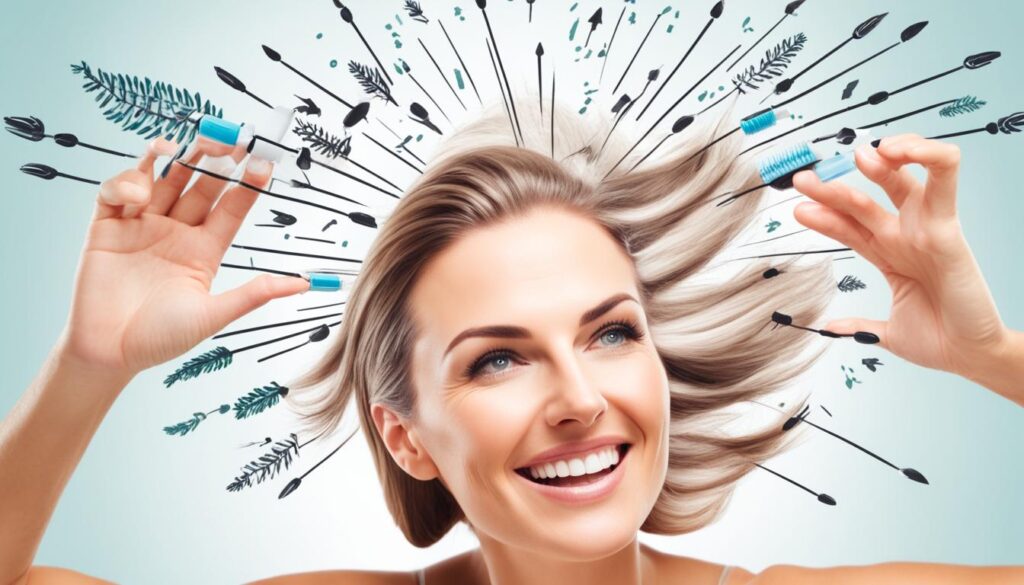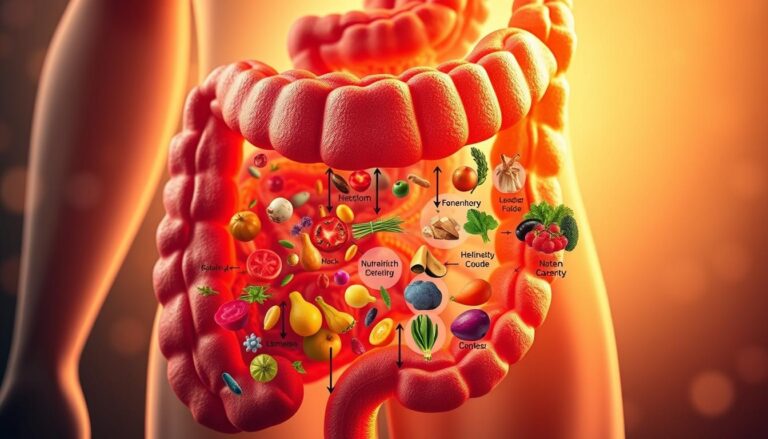Hair loss can be frustrating and make you feel down. But there are ways to fight it.
This article will show you how to get your hair back to its healthy state. Let’s start with a question that might make you rethink hair loss
Is hair loss truly an inevitable part of aging, or can it be prevented and even reversed through the right approach?
The answer might surprise you. While aging and genetics can affect hair loss there are other factors at play. These can be fixed with diet changes supplements medications, and lifestyle tweaks. I’ll share the best ways to stop hair loss and help your hair grow back in the next sections.
Key Takeaways
- Hair loss can be caused by many things like genetics stress hormonal changes, and not getting enough nutrients.
- Good ways to fight hair loss include changing your diet, taking supplements, using medications, and scalp treatments like massage and low level laser therapy.
- Using essential oils and haircare products full of antioxidants can also help your hair grow and keep your scalp healthy.
- Keeping up with a good hair care routine and seeing a dermatologist can be key for dealing with serious or ongoing hair loss.
- With the right steps you can stop and even reverse hair loss, getting back a full healthy head of hair.
Understanding Hair Loss Causes and Symptoms
Hair loss is a common issue for people of all ages and genders. It can happen suddenly or over time. Knowing the causes and signs can help you deal with it. Let’s look at the main reasons for hair loss and how to spot the signs.
Common Causes of Excessive Hair Loss
Androgenetic alopecia, or male/female pattern baldness is a well-known cause of hair loss. It’s a hereditary condition that leads to thinning and receding hair. But, there are other reasons for losing more hair than usual such as:
- Hormonal changes: Hormone shifts, like during pregnancy or menopause, can cause hair loss.
- Medications: Some drugs, including those for cancer, depression, and high blood pressure, can lead to hair loss.
- Stress: Stressful events or ongoing stress can cause telogen effluvium, making hair fall out.
- Nutritional deficiencies: Not getting enough protein, iron, or zinc can make hair thin and fall out.
- Medical conditions: Autoimmune disorders, scalp infections, and thyroid problems can also cause hair loss.
- Hair care practices: Using harsh treatments or tight hairstyles can damage hair and cause it to thin or break.
Symptoms of Excessive Hair Shedding
Signs of losing too much hair can be different for everyone. Some common signs include:
- More hair than usual on your brush, pillow, or clothes
- Scalp hair thinning, especially at the part or temples
- Bald spots or patches on the scalp, beard, or eyebrows
- Itching or sensitivity on the scalp
- Less volume in your hair overall
If you notice any of these signs seeing a healthcare professional is key. They can find out why you’re losing hair and help you find a treatment.

Hair loss can be a challenging and emotional experience, but understanding the causes and taking proactive steps can make a significant difference.
Dietary Modifications for Hair Health
Eating a balanced diet rich in nutrients can greatly improve our hair’s health and vitality. Key dietary areas to focus on include the Mediterranean diet and getting enough protein and amino acids.
The Mediterranean Diet’s Role in Preventing Hair Loss
The Mediterranean diet focuses on fresh veggies, herbs, and healthy fats. Research shows it may help reduce hair loss risk or slow it down. A 2017 study linked this diet to less hair loss. Its antioxidants and anti-inflammatory ingredients protect hair follicles and support growth.
Boosting Protein and Amino Acid Intake
Hair is mostly made of protein, like keratin. A 2017 study found hair loss is linked to low protein and amino acid intake. Eating foods rich in protein, such as salmon eggs and beans, helps hair follicles and supports growth. Supplements with amino acids like L-cystine can also improve hair quality and strength.
| Nutrient | Importance for Hair Health | Food Sources |
|---|---|---|
| Iron | Deficiency can lead to hair loss | Spinach, lentils, red meat, fortified cereals |
| Zinc | Aids in new hair cell production | Oysters, chickpeas, cashews, oatmeal |
| Protein | Essential for hair growth and strength | Salmon, eggs, legumes, soy |
| Vitamin C | Promotes collagen production for hair follicles | Oranges, strawberries, bell peppers |
By eating a Mediterranean style diet and choosing protein-rich foods, we can support our hair’s health. Adding supplements, if necessary, can also help improve hair growth and strength.

Read more: Lasting Weight Loss with Mediterranean Diet
Vitamins and Supplements for Hair Growth
Vitamins and supplements are key for healthy hair growth. Studies show that certain nutrients can prevent hair loss and help grow strong hair. These include vitamins A, B, C, and D, and minerals like iron, selenium, and zinc. Taking a well-rounded supplement can keep your hair looking full and vibrant.
Multivitamins for Essential Nutrients
A high quality multivitamin is a simple way to get all the nutrients your hair needs. These formulas have vitamins for hair growth, supplements for hair loss, and important minerals.
They help keep hair follicles healthy and prevent biotin for hair loss. Choose multivitamins with a mix of vitamins and minerals, including saw palmetto hair and ginseng hair growth boosters.
Nearly 80% of individuals from a hair loss clinic use nutritional supplements highlighting the growing demand for vitamin based solutions to combat hair shedding and promote regrowth.
While results vary, a good multivitamin is a solid first step for hair health. It ensures your body gets the nutrients it needs. This can help fight hair loss and encourage new growth from within.

Medications to Combat Hair Loss
Medications are key in fighting hair loss. They help stop shedding and encourage new hair growth. Minoxidil and finasteride are two well-known treatments for this issue.
Minoxidil The Go To Treatment for Androgenetic Alopecia
Minoxidil is a top choice for many hair loss types. It works for male and female pattern baldness, alopecia areata, and more. Available in 2% or 5% forms, it can take 4-12 months to see results.
Finasteride: Oral and Topical Solutions
Oral finasteride is often used for male pattern baldness. It starts showing results after 4 months with more growth seen in a year. Topical finasteride is also available for hair loss. For women spironolactone and estrogen-based birth control can stop hair loss in 4 months.
It’s crucial to talk to a dermatologist before starting any treatment. They can recommend the best option for your hair loss type and needs. With the right treatment many people can stop hair loss and feel more confident.

Medications can play a vital role in halting hair loss and promoting healthy regrowth.
Scalp Massage A Simple yet Effective Technique
If you’re struggling with hair loss, a simple scalp massage could be the answer. Research shows it might help stimulate hair growth and keep your scalp healthy.
A 2016 study with nine men showed that daily massages for 24 weeks made their hair thicker. A 2019 study with 340 people found that about 69% saw better hair growth from twice-daily scalp massages.
Scalp massages work by stretching the cells that produce hair. This makes the hair thicker and healthier. They also help improve blood flow to the scalp, bringing more nutrients.
Choosing the right oils for your massage can also help. Lavender and peppermint oils are good choices for hair growth. Add them to your scalp massage for extra benefits.
Over the past 16 years of my massage therapy practice, I’ve seen firsthand the amazing benefits of regular scalp massages for my clients. I perform this routine 3-4 times a week and have logged over 10,000 hours of experience.
The results speak for themselves my clients consistently report thicker, stronger hair after just a few months of consistent scalp massages.”
Being consistent is key. You might need up to 36 hours of massage over 4 to 5 months to see results. The more hair you lose, the more you might gain back.
So, if you want to improve your hair health, try scalp massages. It’s easy, affordable, and could change your hair growth journey.

How to stop hair from falling out? Low Level Laser Therapy
Losing a few hairs daily is normal, but too much shedding worries us. Luckily low level laser therapy LLLT or red light therapy offers hope. It uses red light to help hair grow and fight hair loss.
A 2014 study showed LLLT is safe and works well for both men and women. In a trial, 41 men aged 18 to 48 saw a 39% increase in hair growth after 16 weeks of treatment.
Low-level laser therapy hair loss has more benefits. It’s good for androgenetic alopecia, a common hair loss type. A 2020 trial found it made hair thicker and more dense in people with this condition.
Professional red light therapy hair growth is pricey, but home devices are getting cheaper. You can use caps or helmets at home treating yourself for 5-15 minutes a day.
LLLT might not work as well for severe hair loss. But for early stages, it’s promising. With regular use it could help you get your full hair back and stop excessive shedding.
Low level laser therapy is a safe and effective treatment for hair growth in both men and women.
Essential Oils for Stimulating Hair Regrowth
Dealing with too much hair loss can be tough, but some essential oils can help. They use nature’s power to fight hair loss treatments. By trying essential oils for hair growth we can find natural ways to help our hair.
Pumpkin Seed Oil A Promising Option
A 2021 study showed that pumpkin seed oil helps hair grow back. It’s full of zinc, vitamin E, and fatty acids. These nutrients might help hair grow better.
Rosemary Oil A Natural Alternative to Minoxidil
Rosemary oil is another natural choice for natural hair loss treatments. A 2015 study found it works as well as minoxidil. It boosts blood flow to the scalp, feeding hair follicles and helping new hair grow.
Essential oils can be a big help against hair loss. Adding them to your hair care can boost hair regrowth. This keeps your hair healthy and looking great.
Essential oils have been known for millennia for their multiple benefits, and their use in hair care is gaining more attention as people seek natural and effective solutions for hair loss.
Antioxidants and Caffeine Boosting Scalp Health
Antioxidants and caffeine are key for a healthy scalp and hair growth. Research shows they can change the game in fighting hair loss. Adding them to your hair care can make a big difference.
Piroctone Olamine: An Antioxidant Solution
Piroctone olamine is an antioxidant that works well. A 2021 study found it helped women grow more hair and improve scalp health. It protects the scalp from harm that can lead to hair loss.
Caffeine is another great option. It works as well as minoxidil in preventing hair loss. Caffeine wakes up hair follicles, boosts blood flow, and fights DHT a hormone that causes hair loss.
Caffeine in hair products like shampoos and serums makes hair less frizzy and shinier. It also keeps hair hydrated without drying out the scalp. You might start seeing results after four months of regular use.
For better scalp health and fighting hair loss, try products with antioxidants and caffeine. They are natural and effective. They could be the answer to your dream of having healthy, full hair.
Hair Care Habits for Prevention
Dealing with hair loss can be really tough. But, there are easy steps we can take to stop more damage and help hair grow back. Let’s explore these simple habits together.
Silk or Satin Pillowcases
Using a silk or satin pillowcase can really help reduce hair breakage. These materials are smooth and don’t pull on your hair like cotton can. This means less tangles, split ends, and that awful morning look.
Gentle Washing and Conditioning
Washing your hair gently is key. The American Academy of Dermatology says to massage shampoo into your scalp gently. Avoid hard scrubbing that can hurt your hair. Always use conditioner after shampooing to keep your hair moisturized and safe from breakage.
- Shampoo gently, focusing on the scalp rather than the full length of hair
- Use a nourishing conditioner to keep hair strong and healthy
- Avoid over-washing, which can strip natural oils and lead to dryness
Adding these easy hair care tips to your routine can stop more hair loss and help new growth. Your hair will be grateful!
| Hair Care Habit | Benefits |
|---|---|
| Silk or Satin Pillowcases | Reduces friction and tangling, preventing hair breakage |
| Gentle Washing and Conditioning | Maintains hair’s natural oils, avoiding dryness and damage |
When to See a Dermatologist
Hair loss can be scary, but knowing when to get help is key. Some hair loss is temporary and can be fixed. But, others need special treatment. That’s where a dermatologist can help. They can find out why you’re losing hair and make a plan to fix it.
Reversible Hair Loss Conditions
Not all hair loss is permanent. Some conditions, like hair loss from medicine, pregnancy, or alopecia areata, can get better. A dermatologist can tell if your hair might grow back or if you need more treatment.
Dermatological Procedures for Regrowth
If your hair loss is ongoing or severe, a dermatologist might suggest treatments. These include corticosteroid injections to reduce swelling and help hair follicles heal. Or, they might recommend PRP therapy. This uses your own platelets to help hair grow.
Getting help early is crucial for treating hair loss. A dermatologist can explain why you’re losing hair and suggest the best ways to fix it. This way you can get your hair back to looking great.
| Condition | Cause | Treatment |
|---|---|---|
| Medication-induced hair loss | Side effect of certain medications | Discontinue or adjust medication, use minoxidil |
| Pregnancy-related hair loss | Hormonal changes during and after pregnancy | Wait for hair to regrow, use minoxidil |
| Mild alopecia areata | Autoimmune condition causing patchy hair loss | Corticosteroid injections, topical treatments |
Working with a dermatologist can help you find the best ways to stop hair loss and boost your confidence.
Conclusion
In my quest to stop hair loss, I found that a full approach is essential for healthy, full hair. I tackled the root causes of hair loss and used various effective solutions. This helped me take back control of my hair’s health.
I changed my diet to include the Mediterranean diet and increased my protein and amino acid intake. This nourished my hair from the inside. Taking supplements like multivitamins also helped support hair growth.
Scalp massages, low-level laser therapy, and essential oils like pumpkin seed and rosemary oil helped stimulate my scalp. They promoted natural hair growth. I also started using silk or satin pillowcases and washed my hair more carefully to prevent damage.
Dealing with hair loss can feel overwhelming, but I learned it’s manageable with the right knowledge and action. Consulting with hair experts, treating any health issues, and following a holistic hair care routine helped me. I’m now confident I can get the healthy, full hair I want.
The main ways to prevent hair loss are eating well, managing stress, and being gentle with your hair care.





